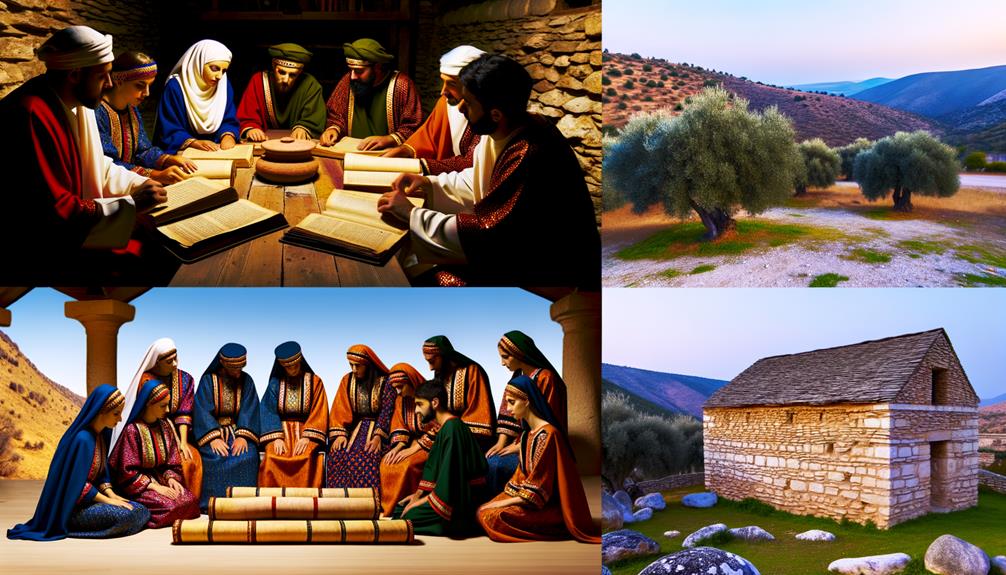48 Meaning in the Bible: Endurance and Faith
The number 48 in the Bible holds significant symbolic value, primarily exemplified through the allocation of 48 cities to the Levites as recorded in Numbers 35:7. This allocation underscores themes of divine order, religious authority, and societal structure, mirroring God’s meticulous orchestration in both earthly governance and spiritual domains.
Additionally, the number 48’s appearance reinforces God’s promises and the completion of divine plans, mirroring the structured passage of time and prophetic significance. The number embodies the fulfillment of covenantal commitments, echoing the continuity of law and prophecy from the Old to the New covenant.
Discover more intricate layers of divine meaning and theological insights.

48 Meaning in the Bible: Symbolism of Foundation, New Beginnings, and Spiritual Renewal
| Aspect | Biblical Meaning |
|---|---|
| Foundation & Creation | The number 4 represents the foundation of the Earth, stability, and God’s creative works in the world. |
| New Beginnings & Renewal | The number 8 symbolizes new beginnings, renewal, and regeneration, often linked to resurrection and spiritual rebirth. |
| Spiritual Growth | Together, 48 reflects spiritual growth through the firm foundation of faith, leading to renewal and fresh starts. |
| Divine Stability | This number emphasizes the importance of establishing a solid spiritual foundation for new beginnings in life. |
| Regeneration | 48 signifies the process of regeneration and transformation, encouraged by God’s creative power and new beginnings. |
The Symbolism of Numbers

The symbolism of numbers in the Bible is a complex and multifaceted topic that has intrigued scholars for centuries, as these numbers often carry significant theological, moral, and eschatological meanings.
Biblical numerology explores how numbers such as 3, 7, 12, and 40 are imbued with symbolic meaning, reflecting divine perfection, completeness, or judgment.
For example, the number 7 frequently symbolizes divine completeness or spiritual perfection, as seen in the seven days of creation.
Similarly, the number 40 often represents periods of testing or trial, evidenced by the 40 days of Jesus’ temptation in the wilderness.
Understanding these numerical symbols is essential for interpreting biblical texts, as they provide deeper insights into God’s nature and the unfolding of His divine plan throughout history.
48 in the Old Testament

In the Old Scriptures, the number 48 appears in various contexts, each contributing to a nuanced understanding of its symbolic and theological significance within the biblical narrative.
One notable instance is the allocation of 48 cities to the Levites, as detailed in Numbers 35:7. These cities, spread across Israel’s tribes, symbolize the pervasive presence of religious and judicial authority.
Additionally, the number 48 can be indirectly linked to the Jubilee cycles, reinforcing themes of restoration and divine order. The meticulous enumeration of these cities underscores the importance of structure and sanctity in Israelite society.
Consequently, the number 48 in the Old Scriptures is not merely a quantitative detail but a figure imbued with profound religious and societal connotations.
48 in the New Testament

Examining the New Covenant reveals that while the number 48 does not appear directly, its symbolic implications and thematic resonance from the Old Covenant continue to underscore elements of divine order and ecclesiastical governance.
The New Scriptures perpetuate the idea of structured spiritual leadership and community organization, which can be traced back to the Levitical cities.
- Apostolic Foundations: The twelve apostles symbolize a continuation of divine governance.
- Ecclesiastical Hierarchy: Early church structures reflect order reminiscent of Old Scriptures precedents.
- Scriptural Continuity: Themes of law and prophecy shift seamlessly.
- Christological Fulfillment: Jesus is seen as fulfilling Old Covenant promises.
This continuity emphasizes the cohesive nature of biblical theology.
Prophetic Significance

Prophetic literature within the Bible often employs numerical symbolism to convey deeper theological truths. The number 48, although infrequently mentioned, can be interpreted to signify completeness and divine orchestration within the prophetic narrative.
This interpretation arises from examining prophetic texts where numbers symbolize intricate divine plans. The number 48 may imply the culmination of certain divine processes, reflective of God’s meticulous control over time and events.
For instance, the allocation of 48 cities to the Levites in Numbers 35:7 can be seen as indicative of a divinely ordained structure, highlighting God’s provision and order.
48 and Divine Order

The number 48, within the framework of biblical numerology, serves as a witness to divine order, reflecting the meticulous and purposeful arrangement instituted by God in various scriptural instances. This numeric symbolism underscores a divine blueprint manifest in diverse biblical contexts, illustrating God’s sovereign control and intentional design.
- Levitical Cities: The 48 cities allocated to the Levites, as described in Numbers 35, exhibit God’s ordered provision for priestly duties.
- Weeks in a Year: The approximate number of weeks in a year, symbolizing the structured passage of time.
- Symbolic Multiples: Multiple of 12 (tribes of Israel), indicating completeness and governance.
- Temple Service: Corresponds to priestly shifts and sacred services.
This intricate numeric pattern reveals an overarching divine organization.
Fulfillment of Promises

Building upon the theme of divine order, the number 48 also epitomizes the fulfillment of God’s promises, as evidenced in various biblical narratives where this number underscores the realization of divine covenants and assurances.
For instance, the allocation of 48 cities to the Levites (Numbers 35:7) embodies God’s promise to provide for those who serve Him. This allocation was not merely a logistical arrangement but a divine assurance of sustenance and sanctuary for the priestly tribe.
Additionally, the prophetic timeline often incorporates periods of 48 days or years, symbolizing intervals leading to the fruition of divine pledges.
Consequently, the number 48 recurrently surfaces as a marker of divine fidelity and the ultimate manifestation of God’s covenantal commitments.
48 in Biblical History

In examining biblical history, the number 48 emerges as a significant numerical motif that intersects with pivotal events and divine ordinances, thereby enriching our understanding of its theological and symbolic importance. This number appears in various contexts, each one contributing to a broader comprehension of its role in the biblical narrative.
For instance:
- The Levitical cities: 48 cities were allocated to the Levites (Numbers 35:7).
- The temple service: Rotation of priestly duties often involved cycles that included the number 48.
- King Solomon’s reign: Certain administrative and structural decisions were influenced by periods involving the number 48.
- Prophetic timelines: Some prophets referenced periods involving 48 months or years.
These instances underscore the number’s integrative role in biblical history.
Spiritual Lessons From 48

Exploring the spiritual lessons encapsulated by the number 48 in the Bible reveals profound insights into divine order, covenantal relationships, and the intricate interplay between temporal and eternal realities. The number 48 appears in various contexts, symbolizing foundational structures and completeness within biblical narratives. This numerical representation often underscores the establishment of divine principles and the perpetuation of God’s covenant with humanity.
| Aspect | Biblical Significance |
|---|---|
| Divine Order | Reflects spiritual governance and regulation |
| Covenantal Relationships | Underscores lasting divine-human agreements |
| Temporal-Eternal Interplay | Connects earthly events to eternal truths |
| Foundational Structures | Symbolizes completion and stability |
| Prophetic Insights | Offers foresight into divine plans |
Thus, understanding 48 aids in comprehending broader theological themes and their practical implications.
Conclusion
The number 48 in the Bible encapsulates profound symbolism, ranging from divine order to the fulfillment of promises.
Analyzing its occurrences in both the Old and New Scriptures reveals a complex tapestry of spiritual lessons and prophetic significance, akin to a multifaceted gem reflecting divine wisdom.
Biblical history illustrates that 48 holds a unique place in conveying God’s structured plans and covenantal assurances, offering insightful reflections for theological study and spiritual growth. The number 48 is often associated with completion and fulfillment in the Bible, as seen in the 48 cities of priestly inheritance and the 48 leaders who assisted in rebuilding Jerusalem’s walls. This biblical significance of 48 extends to the 48-fold structure of the Tabernacle and 48-fold consecration of the priests, demonstrating its role in conveying divine order and purpose. Furthermore, the biblical significance of 21 days is highlighted in the accounts of Daniel’s fast and the angelic encounter, emphasizing the importance of perseverance and spiritual warfare in the pursuit of God’s purposes.






